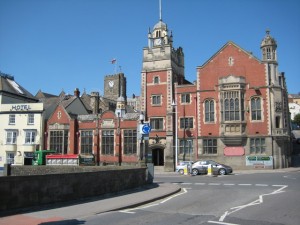There’s much wailing and gnashing of teeth this morning in the media regarding the ruling by a court that Bideford Town Council doesn’t have the right to hold prayers as part of the meeting. This article by the BBC is a fair summary. Sample headlines include
Christianity on the rack as judge bans public prayer (The Times)
Christianity under attack: Major court rulings that go against British worshippers are branded an ‘assault on national heritage’ (Daily Mail)
Government tells councils to carry on praying despite High Court ban (Telegraph)
The National Secular Society, which backed the case, is, unsurprisingly, trumpeting it as a major victory. Meanwhile, the more hysterical conservative commentators are up in arms at what they perceive as judicial bias against Christianity.
However, as the BBC article points out,
the case was not won on human rights grounds but on a point of statutory construction of local government legislation.
The specific issue is that local councils do not have what is known as a “general power of competance”. That is, unlike the rest of us (and any other organisation such as a charity or business), they are only permitted to do exactly what the legislation permits them to do. That’s a reversal of the normal principle, which is that everything is permissible unless explicitly prohibited.
The question on which this case turned was section 111 of the Local Government Act 1972, which, inter alia, gives councils a limited right to do anything “which is calculated to facilitate, or is conducive or incidental to, the discharge of any of their functions”. That’s not a general power of competance, because, although it can be interpreted fairly widely, it is still a necessity for the council to demonstrate beyond reasonable doubt that something they do will facilitate or be conducive to what they otherwise do. The judge has ruled that prayers cannot be so justified, although there is sufficient ambiguity that he has allowed leave to appeal.
What this means, in plain English, is that because the council can’t prove that prayer does anything useful, it can’t be said to be conducive or facilitative. Whether or not he’s right about that is, of course, a matter for debate, but if he is right then he has probably made the right decision.
What makes the case interesting is that in 1972, when this law was enacted, the reverse would almost certainly have been the case – with a far larger active Christian population, a court would have agreed that prayer does do something useful. The intent of the legislators was certainly to permit prayers to take place, since prayers have been a part of council meetings since time immemorial and neither parliament nor the public would have accepted a law prohibiting them. So what we have here is a case where the intent of the legislators, and the initial interpretation of their wording, has been overturned by a later change in society which results in a new interpretation of the self-same words. That has a lot of interesting ramifications, well beyond the scope of this particular case.
However, it’s something of a phyrric victory for the NSS, who brought the case. They were originally hoping that prayers would be ruled in breach of the human rights of atheist councillors, but the judge disagreed with them on that point. So if some other regulation can be found which permits prayers, then this case has established that there is no overriding principle which prohibits them – the NSS has won the ruling on a technicality, but lost on the substantive argument. This case has shown that, in the absence if a technical reason to forbid them, prayers are otherwise perfectly legal. As the ruling itself says:
The saying of prayers as part of the formal meeting of a Council is not lawful under s111 of the Local Government Act 1972, and there is no statutory power permitting the practice to continue. If it were lawful, the manner in which the practice is carried out in the circumstances of Bideford does not infringe either Mr Bone’s human rights nor does it unlawfully discriminate indirectly against him on the grounds of his lack of religious belief.
The National Secular Society has, therefore, achieved a very good result for religious freedom, since the court has ruled that prayers do not infringe human rights. And, as it happens, the technicality itself will soon become moot. The Localism Bill currently in progress through parliament grants councils a general power of competence, which will permit prayers as part of council meetings.
So all Bideford Town Council (or any other council which may be facing similar action) has to do is suspend prayers until the Localism Bill becomes law, at which point they can reinstate them.

